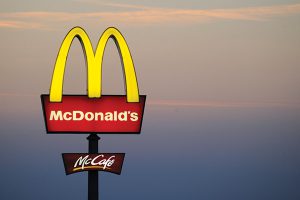McDonald’s Corp has just raised the price of a cheeseburger in its UK restaurants for the first time in 14 years, by a supersized 20% to £1.19 ($1.43) from 99p. Something must be done.
The rising cost of a beef patty is symptomatic of the surge in prices that should prompt the Bank of England (BOE) to hike its official rate by half a percentage point to 1.75%. Inflation running at a 40-year high of 9.4% dictates firmer action than the previous six consecutive increases of 25 basis points or fewer. It would also reflect the 50 basis-point July hike from the European Central Bank (ECB), and the three-quarter point Federal Reserve increase last week. Collective action always makes more of an impact.
However, for all the major central banks, life is about to get much more complicated. One-handed economists are rare beasts indeed, and many would prefer to have more than two hands presently to explain the conflicting macro-economic backdrop. Rampant inflation, stuttering economic growth and the risk of Russia cutting off much of Europe’s energy supply leaves central banks making policy decisions in pretty gloomy conditions.
That explains why central banks are tossing forward guidance into the lexicographic graveyard that’s already absorbed transitory inflation. Data dependency is the new mantra; laying out a specified interest-rate path really ought to be for emergency times only, and recent press leaks from both the ECB and Fed show that expected decisions are being amended right before official meetings in response to rapidly changing data.
The BOE is likely to restrict itself to a single double-sized move in this rate cycle before reverting to its standard quarter-point increment. And there may not be too many more of those either; if the Monetary Policy Committee (MPC) does hike to 1.75%, it’ll close in on the likely peak of about 2.5%.
More details are also likely on the central bank’s approach to reducing its £866 billion quantitative-easing portfolio. Since March, the BOE no longer reinvests maturing debt, but the further step to actively sell its gilt holdings will likely double the pace of balance-sheet reduction to between £50 billion and £100 billion in the first year, with a final decision expected in September. It is hard to assess the combined effect of withdrawing QE liquidity at the same time as raising interest rates, but it may lessen the level of borrowing costs deemed appropriate to slow inflation.
There will be updated estimates at the quarterly economic review, which should offer a guide as to how quickly the BOE expects inflation to drop back towards its 2% target over the next three years. Just as important is whether recession is avoided. It will be a close call; the International Monetary Fund expects hardly any growth for the UK next year, albeit it is not renowned for its accuracy in predicting the British economy.
Fiscal stimulus is coming, however, as the Tory leadership campaign is turning into a competition of how much and how swiftly taxes are going to be cut. Even the formerly frugal ex-Chancellor of the Exchequer Rishi Sunak is now proposing removing the 5% sales tax on motor fuel. Foreign Secretary Liz Truss, the frontrunner in the race to be prime minister, is promising a splurge worth close to £40 billion. The MPC will calibrate tweaking monetary policy to counteract inflationary impulses from more cash in pay packets.
As the burger shocker shows, day-to-day expenditures are still rising fast for Britons.
—Bloomberg
 The Gulf Time Newspaper One of the finest business newspapers in the UAE brought to you by our professional writers and editors.
The Gulf Time Newspaper One of the finest business newspapers in the UAE brought to you by our professional writers and editors.
